- Home
- Michael Dobbs
Last Man to Die Page 11
Last Man to Die Read online
Page 11
A special observation post had been erected overlooking the river on a hill above Xanten, complete with camouflage netting, mobile caravan and a host of junior liaison officers who hung around chatting in the background. From their vantage point they could see the broad sweep of the Rhine as it unfolded in front of them, a great ribbon of water disappearing northwards like a winding road into the early morning haze which still clung to its edges. To their left lay the ruins of Xanten, the spire of its church savagely torn off, the town emasculated, while above them scurried squadrons of fighters like swarming bees on a ceaseless mission through skies which were beginning to turn crystal blue as the sun burnt off the mist. It was a good day for dying, and there would be plenty of it before nightfall.
Churchill, in a bulging uniform of the 4th Hussars which he chose to wear on his visits to the front, clapped his hands in excitement as he turned to Eisenhower. ‘My God, but this makes the blood run thicker through the veins!’ There was strong colour in his cheeks for the first time in weeks, and the sparkle had returned to his eyes. ‘How I envy you fighting men. In my lifetime, General, I have seen war grow steadily more murderous and awesome, and perhaps I should be condemned for finding any glory in such a deadly clash of wills, but this’ – he waved a gloved paw across the panorama in front of them – ‘this is so exhilarating! You know, the easiest way of telling the true character of a man is to study his response to the call of the bugle – does it fill his guts with fire or render them liquid with fear? That’s when you know his real worth.’
Eisenhower, who hadn’t heard a bugle sounded in anger since reveille at boot camp, nodded and said nothing. He hadn’t wanted the Old Man here at the battle front, but Churchill had insisted – and Eisenhower knew that as usual he would try to interfere, throwing off an abundance of home-spun military theories and anecdotes with all the energy and subtlety of an exploding catherine wheel. As if launching the major Allied crossing of the Rhine wasn’t going to present him with enough difficulties … For a short while, however, Eisenhower would have no reason to worry, since further conversation was made impossible as the massed guns below commenced their barrage of the German positions on the opposite bank, filling clear skies with the menace and anger of thunder. They watched, mesmerized by the pinpricks of fire from nearly 2000 artillery barrels and the great plumes of smoke and destruction that erupted seconds later on the far bank. In response there were but a few tiny flickers of resistance from the positions facing them.
As instantly as it had begun the shelling ceased, as though the film they were watching had been pulled from its projector. There was silence, more deafening in its way than the sound of the guns, a stillness which surrounded them like a cloak, making the moments seem like hours and sending a shiver of anticipation through the tiny group. Eisenhower consulted his watch. ‘Time for the drop.’
Yet they were not to have it all their own way. No sooner had he spoken than, away in the great distance, a thin white trail of smoke or condensation began to climb slowly into the sky.
‘Hell fire,’ Eisenhower muttered, the satisfaction gone from his voice. ‘A V-2, on its way to London, I’d guess.’
‘No, General. Remember your Bible, when Moses led his tribes across the Red Sea. There was a pillar of smoke then, too. We have God’s blessing this day.’
‘Unfortunately, in my experience the Germans are very bad at reading smoke signals,’ Eisenhower responded caustically. It was all very well for the Old Man to come and make speeches from the hill top, like a new Sermon on the Mount, proclaiming his belief in God, but they were Eisenhower’s men down there about to die and after all these years of war he found death a more concrete concept than the Hereafter.
Then the Dakotas came, wave after wave of them, flying low and in tight formation with their fuselage doors open and men standing in the doorway, ready to jump. They had all but disappeared into the mists across the Rhine when the group on the hilltop began to see the parachutes open, falling gently as seed might be scattered on the ground. And there was reaping along with the sowing; soon the Dakotas returned, many in trouble and some on fire. The far bank was not going to be vacated by the enemy without a struggle. And the German guns seemed to have gained strength, pouring a hail of shells across the river and into the Allied positions. Soon a salvo of enemy shells began to creep towards the hilltop, gouging out a crater of earth and destruction as each shell stretched ever closer. Junior officers rushed forward to hustle the Prime Minister and the Supreme Commander back towards safety, but Churchill ignored them, stepping forward as if to meet the challenge head-on, oblivious of the danger, seeming to show supreme faith that this was not his time to die. Eisenhower, embarrassed by the older man’s bravado, brushed aside the protests of his staff and stayed out in the open. He was damned if he was going to be shown up by a seventy-year-old civilian.
Soon the moment had passed, the shells were gone, and Eisenhower was left with a feeling of deep irritation at the stupidity of it all. He didn’t share the Old Man’s direct line to God and the moment of danger had left his mouth dry. It would have been a pathetic way to go, the Supreme Commander and the Prime Minister swept away just when the victory was theirs to claim, all for a moment of petty play-acting. Heaven rid him of meddlesome politicians!
Churchill’s face was glowing when eventually he turned away from the view. ‘Marvellous! Marvellous!’ was all he could say. As he stepped closer to Eisenhower, however, his face took on a more considered expression, a scowl of concentration seeming to split his forehead in two. Something was bothering him.
‘My dear General, you have done a magnificent job today. I have no doubt that by nightfall we shall have achieved our objectives and another great step taken towards final victory.’
The old bastard’s buttering me up, Eisenhower said to himself. What does he want?
‘Seeing the valour of our troops and the selfless way they are willing to lay down their lives for that victory, it makes me more certain than ever that we have no option, in honour, but to ensure that their courage and sacrifice are not offered in vain.’
So that’s it! He never gives up …
‘We cannot afford to win the war yet see the peace we have worked so hard to build thrown away. We must push as far east as possible – surely you must see the sense in that?’
‘As far as Berlin, Mr Prime Minister?’
‘At least as far as Berlin …’
The American shook his head, slowly and deliberately. He had guessed this would come, they had told him Churchill was as hard to shift as a mule in mud, but now he felt almost relieved that he had taken so badly to Churchill’s vainglorious defiance of the German shelling. It made him more determined than ever to get this over and done with, and if it meant some plain speaking to the Old Man without any of the diplomatic niceties, well – sure as hell he was in the mood for it.
‘It’s too late. Over. Done with. Let me make this clear, Mr Churchill. Berlin isn’t going to happen.’
The Prime Minister was taken aback. He wasn’t used to such outspoken defiance. ‘No’ is not a word used between allies, not baldly and up front like this. ‘But surely that is mistaken …’ He bit his lip. His lisp became much more pronounced when he was off guard, and his choice of words was clumsy. ‘General, we could be in Berlin inside a fortnight. You cannot possibly pretend it’s too late …’
‘Mr Churchill, believe me, it’s too late. I’ve already been in contact with Marshal Stalin. And we’ve agreed. Berlin is his.’
Churchill’s lips pouted incredulously like a hooked fish, then his jaw dropped, until it sagged on to his chest. The exhilaration drained from his face and he began to search for his words with uncharacteristic diffidence. ‘You … have taken it upon yourself … to communicate directly with the Russians? Without any reference to me? Or President Roosevelt?’ Churchill could scarcely believe the words, even as he found them. ‘In God’s name, General, what the devil do you think you’re playing at?’ he sh
outed, loudly enough for the aides to wander discreetly a few steps further away. ‘You can’t go round making deals with the bloody Russians!’ He thrust his walking stick into the soft ground, like a medieval knight planting his colours.
Eisenhower did not flinch. ‘On military matters, indeed I can.’
‘This isn’t military. This is high politics. And to my mind, high bloody treason!’
‘Prime Minister, politics may be your game but the military conduct of this war and the defeat of the German armies is my responsibility as Supreme Allied Commander. My conversations with Moscow have been entirely non-political.’
‘Non-political! With Stalin?’
‘With Marshal Stalin as Supreme Commander of the Red Army. Yes.’
The aides of both men had begun to shuffle closer once again, anxious not to be completely out of earshot. This was going to be one for the grandchildren.
‘You have stabbed me in the back. Ruined everything I and my country have fought for all these years.’
‘That’s rot. Berlin’s of no military consequence. It has no great defence industries, no strategic significance. Only piles of smashed coffee shops and hordes of civilians, many of whom are going to be slaughtered no matter who takes Berlin.’
‘It is of supreme political importance, General Eisenhower …’
‘That’s one for the politicians, sir. Not for me. I’m concerned solely with the military aspects of this war which I want to finish with as little loss of Allied life as I can manage. For that it’s essential I come to tactical battlefield agreements with the Russians. That’s all I’ve done.’ There was a small,’ insincere smile playing around Eisenhower’s lips. He had the argument rehearsed word perfect, including all that crap about it having nothing to do with politics. He was a military man but he was beginning to learn about politics. Fast.
The two men stood on the bare hillside, silhouetted against the panorama of the Rhine and its military activity, with all the passion and hostility of the thousands of men below seemingly concentrated in the few feet between them. One aide later said it was like watching an old-fashioned duel, the weapons being words instead of cocked pistols.
‘Be in no doubt, General, that I shall contact the President. Immediately. This decision must and will be overturned. And if it means your removal or even court martial, then so be it!’ Churchill pushed one foot forward towards his adversary, as if preparing to fire.
In contrast the American seemed to relax, shrugging his shoulders, already confident that the threat would miss its target. ‘Think, sir. Think very carefully before you rush into that. You know just how sick the President is. Frankly, he’s been incapable of handling any serious paperwork for several weeks. He’s dying, that’s the view of those around him. And he’s certainly not fit enough to handle matters like this. Any decision will simply be shunted back down the line. Probably right back to me. And it’s inevitable there will be some considerable delay, by which time’ – he shrugged – ‘it will all be history.’
Churchill began to feel he was being outmanoeuvred. He waved his hands as if to imply that the issues were much broader than Eisenhower could possibly contemplate, his voice booming in an attempt to bully the American into submission. ‘War should be a building block, not just a mindless system of destruction! Politics must have its place in the way a war is fought.’
‘Like the sort of politics you’ve been playing with my reinforcements?’
‘What on earth do you mean?’
‘The several thousand troops who should be out there now, winning the war’ – he jerked his thumb in the direction of the great river behind him – ‘instead of scurrying around Britain searching for one escaped prisoner. What is the world going to think, Mr Churchill, of a leader who publicly urges a bloody advance towards Berlin while at the same time privately denying that effort its necessary reinforcements? People might conclude you’ve been playing politics with the lives of tens of thousands of innocent soldiers. Seems to me it’s not just my job that’s at risk here …’
Churchill’s complexion had become suffused with the heat of anger and indignation. ‘You are threatening me, General!’
Eisenhower returned the challenge with steady, ice-cool eyes. ‘Oh, no, Mr Churchill,’ he said softly. ‘I’m just calling your bluff.’
Goebbels watched the broken figure of Hirschfeldt shuffle out the door. The condemnation of a friend who had served the cause faithfully for so many years left no trace of emotion in his face, it was just another sacrifice required by war. He had long ago learned to compartmentalize his emotions, not to allow them to get in the way of doing his job. And he was very good at his job.
Almost before the sagging back of Hirschfeldt had disappeared the doorway was filled with the figure of Captain Otto Misch, also a member of the FBK, immaculately suited in his Waffen SS uniform complete with death’s head insignia and slashing shoulder flashes. Misch was tall, blond, sinewy, every inch as if he had stepped straight out of a recruiting poster, but the three fingers missing on his left hand and the Iron Cross pinned at his neck declared that he was no paper hero. He had seen action, and revelled in it. That was why he had been selected for the elite. Although a veteran, Misch was young, still in his early twenties and, beneath the veneer of the uniform and medals, was still callow with little experience or confidence outside his military life. Ruthless, unquestioning, indefatigable, dedicated to ensuring that his leader’s will was done, but immature and in complete awe of Goebbels – in the Reichsminister’s mind it was an exemplary combination of qualities, which was why he had chosen Misch as his ADC. It had the added advantage, Goebbels mused, that the captain would not dare to respond to the advances which his wife Magda offered so freely to any good-looking young man who came within her orbit, particularly a specimen who, like Misch, made up for his intellectual and social inadequacies with the physical frame of a stallion. The cow always chose someone as different from himself as possible …
And the choice was enormous. It was a deep sadness to Goebbels that National Socialism had attracted over the years so few people of intellectual quality. That hurt. But there had been no time for persuasion and argument, to employ the tools of discussion and debate in the rush to build the Reich. Perhaps if they’d been able to give themselves a breathing space, if they hadn’t invaded Russia so soon …
The click of Misch’s polished heels interrupted Goebbels’ reflections. ‘You called, Herr Reichsminister.’
‘Hirschfeldt. He’s being posted to Prague. Effective immediately. I want that son-of-a-bitch out of here within an hour. See to it.’
‘Zu Befehl!’ Misch responded, but made no move to leave as Goebbels indicated he had something else on his mind.
The Reichsminister rose from his chair and began to pace the small room, trailing one highly polished boot. He’d been born with a club foot which he had dragged behind him all his life, which was why he had always taken care not to be forced to march swiftly in public, to ensure that the cinema newsreels hid the impediment and made him look as whole and as manly as the others. It was why he could never be a leader in his own right, and perhaps why he had been attracted to Hitler from the first. The Fuehrer never marched briskly but always adopted a strolling swagger; it made it easy for Goebbels to keep up without embarrassment. Yet the days spent in claustrophobic underground shelters, with the excursions outside becoming increasingly less frequent, had aggravated his leg. The fuggy atmosphere seemed to stick in the lungs, the blood circulated less freely, the damp seemed to worm its way inside his foot and the dull ache stretched from his toes to every other part of his body and soul. He rubbed his thigh, trying to force the blood to circulate some warmth, but it was no good.
‘Let’s get out of this sewer, Misch. Christ, I need some fresh air.’
Without a word the captain followed him through the door, where they turned right and immediately began ascending a long flight of bare concrete stairs. They proceeded slowly, one step at a time
since the brace on Goebbels’ leg made using stairs difficult. There were lifts, at least when the power supplies were operating, but a few evenings before Goebbels had been stuck in a lift after one of the first bombs of the nightly raid had fractured a main power system. He had been forced to wait for more than two hours in a lightless, tiny steel box which at any moment threatened to become his coffin. He had needed all his considerable mental powers to control his mind let alone his bladder as he waited, powerless and trapped, in the dark to die. It had given him nightmares, a hatred of being stuck underground in these wretched bunkers and an overwhelming, animalistic desire to die out in the open, not in a hole in the ground. So Goebbels didn’t use lifts anymore.
Soon he and Misch were in the gardens of the Reich Chancellery. He stood for a while, allowing the daylight to replenish his energies, breathing in air which bore no taint of the gas filters and oily air-conditioning. The Allied raids had reduced much of the once ornate gardens to a rubbish heap yet the daffodils were in bloom and he plucked one, savouring its faint scent and admiring the lustre and bright colour. The flowers would be blooming in the Alps by now, he thought. The narcissi, the alyssum, the whole mountainside would be bursting with life, and hope.
‘Before the daffodils fade, Misch. We must be ready before the daffodils fade,’ he muttered after several minutes.
‘Yes, sir!’ Misch responded, with as little comprehension as if the Reichsminister had been discussing the finer points of Nietzsche.
‘I must buy time!’ He would trade half his remaining panzer divisions for the few more weeks required to prepare for the Alps. ‘Misch, what does the twentieth of April mean to you?’
‘The Fuehrer’s birthday, sir.’
‘Exactly. Less than a month. We must be ready by then. We won’t have another chance. When they all gather to honour the Fuehrer I want the occasion to be a celebration, not a damned wake. We need something special, an omen, a symbol, something which will turn the gathering into a revival of the German fighting spirit and give us the time we need.’ His eyes burned and his scrawny neck strained like a greyhound in the slips. His thin fingers with their finely manicured nails closed claw-like around the daffodil until it disappeared.

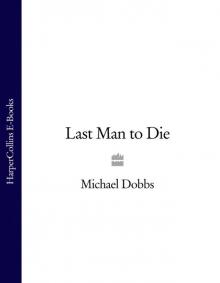 Last Man to Die
Last Man to Die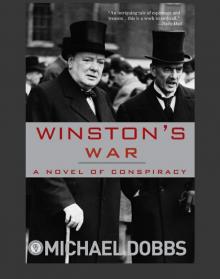 Winston's War
Winston's War The House of Cards Complete Trilogy
The House of Cards Complete Trilogy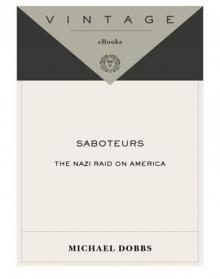 Saboteurs
Saboteurs The Touch of Innocents
The Touch of Innocents WC02 - Never Surrender
WC02 - Never Surrender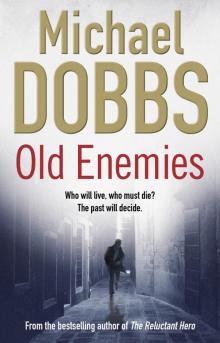 Old Enemies
Old Enemies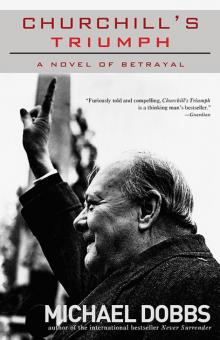 Churchill's Triumph
Churchill's Triumph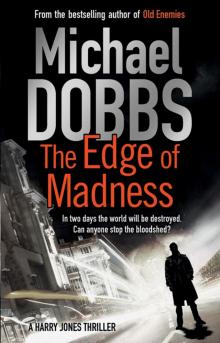 The Edge of Madness
The Edge of Madness Goodfellowe MP
Goodfellowe MP The Final Cut
The Final Cut Whispers of Betrayal
Whispers of Betrayal Churchill's Hour
Churchill's Hour The Buddha of Brewer Street
The Buddha of Brewer Street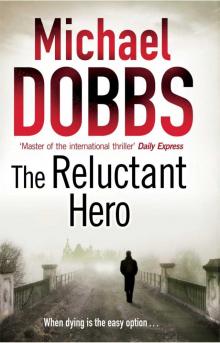 The Reluctant Hero
The Reluctant Hero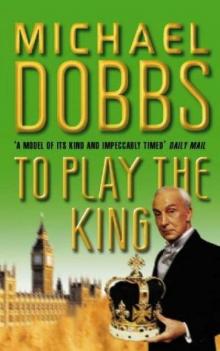 To Play the King
To Play the King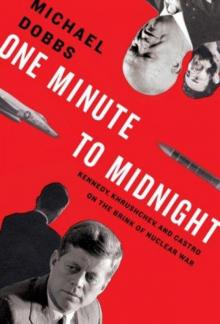 One minute to midnight
One minute to midnight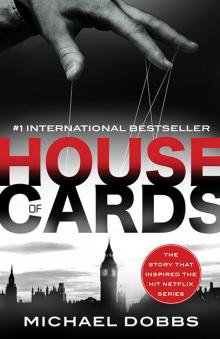 House of Cards
House of Cards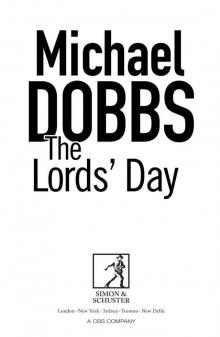 The Lords' Day (retail)
The Lords' Day (retail)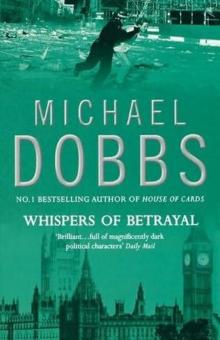 Whispers of betrayal tg-3
Whispers of betrayal tg-3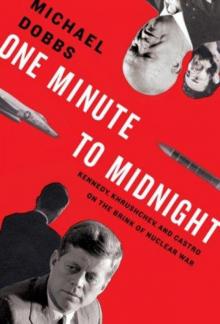 One minute to midnight: Kennedy, Khrushchev, and Castro on the brink of nuclear war
One minute to midnight: Kennedy, Khrushchev, and Castro on the brink of nuclear war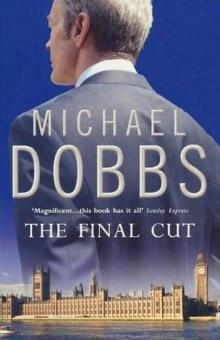 The Final Cut fu-3
The Final Cut fu-3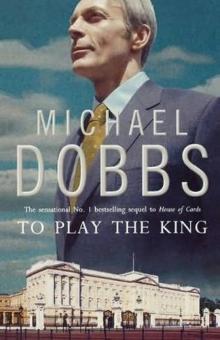 To play the king fu-2
To play the king fu-2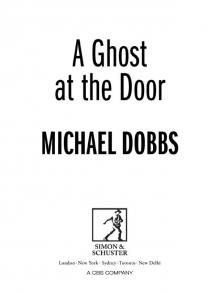 A Ghost at the Door
A Ghost at the Door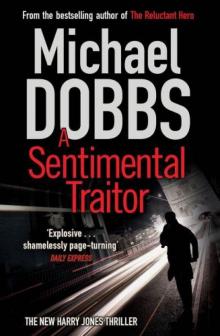 A Sentimental Traitor
A Sentimental Traitor